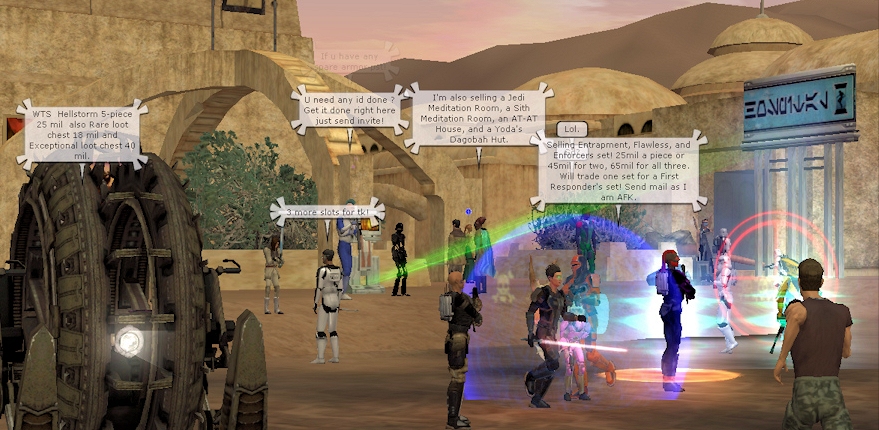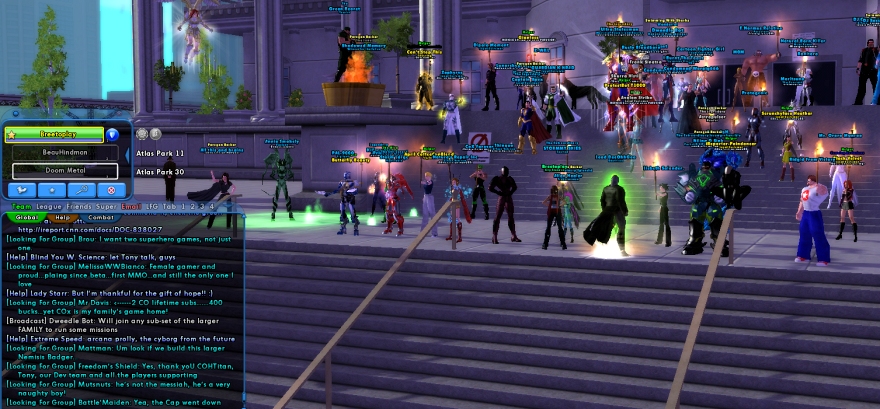
I dug this intriguing question out of our brimming-over letters-to-the-editor bin, and it’s particularly timely given the recent launch of Wander, notable for its curious glyph-based chat and language system. Massively-that-was reader NerdWithABigStick wrote in to ask about MMO chat, calling back the decision made by the devs of Divinity: Original Sin to shut down global chat within a few minutes of launch.
This resonated with me. The first thing I do when joining a game is seek out general chat and immediately turn it off. It’s only in the last six years or so that I’ve noticed an increase in the amount of “snark” in chat. There was definitely a time when chat was fun, helpful, and yes, even entertaining. People shared their positive excitement, and while the occasional asshole did show up, it was the exception, not the norm. That time is long gone, sadly. After working a full day at the office and signing in to a game that I am loving, the very last thing I want to do is to have that happiness and the joy of the experience ruined by reading negative remarks and armchair designer opinions full of Family Guy-style “humor” and poop-slinging. So I’ve gotten into the habit of turning those channels off, sometimes even hiding the chat window entirely.
So I keep wondering whether more game studios, particularly MMO studios, will ever embrace D:OS’s attitude? Will they ever say, “You know what, this really isn’t helping our game — or our community — at all. It’s not adding anything to the game experience or the social experience. In fact it’s detracting from both. Let’s shut it off.”
Heck, I hope not!
Let me back up. I’ve been playing online games a long time too. The one constant I’ve found in all my travels through these online worlds is that jerks are universal. There were jerks then; there are jerks now. And a game-wide or zone-wide chat is the fastest way for them to manifest themselves in your gaming, piss you off, ruin your day, and drive you out of the game.
It wasn’t always so easy for the jerks, though. Ultima Online didn’t have global chat for many years; it had a primitive version of chat bubbles that floated over the heads of the folks within your immediate vicinity, and because spamming could literally cover everyone’s screen, it was considered a serious violation of social etiquette to do it. You would be silenced, reported, and shunned for being annoyware in chat. If you were truly egregious, someone would probably log in his thief to harass you into shutting up. I had a guildie who liked to tame woodland critters and set piles of them to /follow and /guard annoying people around town until the spammers were forced to recall out. Mad vigilante justice, there.

The shift to tidy chat boxes and later to convenient global chat channels made chat a more casual experience — more like everyone jabbering in IRC than trying to stay elegant and afloat at a crowded cocktail party. But there are several other factors that combined in the mid-aughts to turn chat into the monstrosity NerdWithABigStick wants to see eradicated from gaming:
- MMO studios stopped investing in public customer service. Visible gamemasters who once kept the peace by being present were replaced with behind-the-scenes support, creating a belief, fair or not, that no one was monitoring the world or dealing with problem players.
- Online gaming in general shifted from being the semi-private domain of the technologically privileged to being something to which a critical mass of people have easy access. Etiquette took longer to evolve and proliferate than communication tech took to weasel its way into our back pockets. Culture changed to accommodate. “Oversharing” is now a thing. A new generation of gamers grew up plugged in, with a very different conception of personal privacy, shared space, and how they ought to behave in a digital world.
- An oversaturated MMO market, devs’ reliance on easy-to-produce, unsticky gameplay, and the lowered barriers-to-entry engendered by free-to-play business models created transient communities that feel little investment in the games they play, let alone in the other people playing them or their own personal reputations.
- Guilds and other groups protect their members from toxic chat by moving their communities to private channels, websites, and voice chats, further reducing the number of mitigating, rational voices in games’ global spheres.
I don’t really think the percentage of jerks on the internet has changed, but the jerks we already have are now greater in number on the whole, capable of far greater damage within a tech culture that simultaneously lowers their inhibitions and hands them a megaphone or 10 to shout into. For Gen X and the older Millennials, it’s a shock to the system, and it’s why I frequently join NerdWithABigStick in turning off my chat channels too — me, the Editor-in-Chief of an MMORPG website. Seriously.
That’s rock-bottom.

Still, shutting it all down on our end is a temporary solution to a problem that needs a long-term fix from above, and the fix won’t be simple.
Several years ago, Karen Bryan, a columnist for Old Massively, wrote a smart piece on games with supposedly “safe chat” for kids. What she found in her investigation is that safe chat in kid-friendly MMOs is laughable. “Kids find a way,” she wrote ruefully. No manner of filter or blacklist or keyword-based clicky chat stops clever kids from communicating abuse when they are determined to convey it. What heavy-handed chat restrictions do in reality is hinder legitimate communication: They hinder trade, they hinder helpers, they hinder grouping, they hinder socialization. Breaking chat breaks MMOs worse than does the abuse we’re hoping to prevent. As we’ve seen over and over, the chat-based equivalent of “dong-detection software” can’t possibly work as well as an actual moderator.
Now, maybe shutting off the chat valve works for an online game like Hearthstone, whose “chat” is as a limited as the most lawsuit-averse family MMO and cannot even be properly called chat. And maybe it even works in console ports of MMOs where detailed, long-form chat is too tedious or difficult for players to physically manage anyway.
But the core of MMORPGs — real MMORPGs — is community, and communities that can’t communicate are doomed alongside their games. We need to be able to talk to each other, to reach out to each other, to group and trade and teach and learn. We don’t need to be around people all the time, and we don’t need to be engaged in conversation every moment we’re logged in. I don’t want either of those things myself. But without some measure of communication and a reason to chat — even if it’s an imaginary language or wiggly scarf trails — everyone around us may as well be AI. That’s a far worse fate than the irritating abuse and chaos we face in chat now. I’d rather have that messy something than nothing at all.
We’ve lost too much of what makes our genre our genre in the last decade, a truth devs and players of dwindling MMOs are slowly realizing. I don’t want to willingly give up more.
 Are video games doomed? What do MMORPGs look like from space? Did free-to-play ruin everything? Will people ever stop talking about Star Wars Galaxies? Join Massively Overpowered Editor-in-Chief Bree Royce and mascot Mo every month as they answer your letters to the editor right here in Ask Mo.
Are video games doomed? What do MMORPGs look like from space? Did free-to-play ruin everything? Will people ever stop talking about Star Wars Galaxies? Join Massively Overpowered Editor-in-Chief Bree Royce and mascot Mo every month as they answer your letters to the editor right here in Ask Mo.














